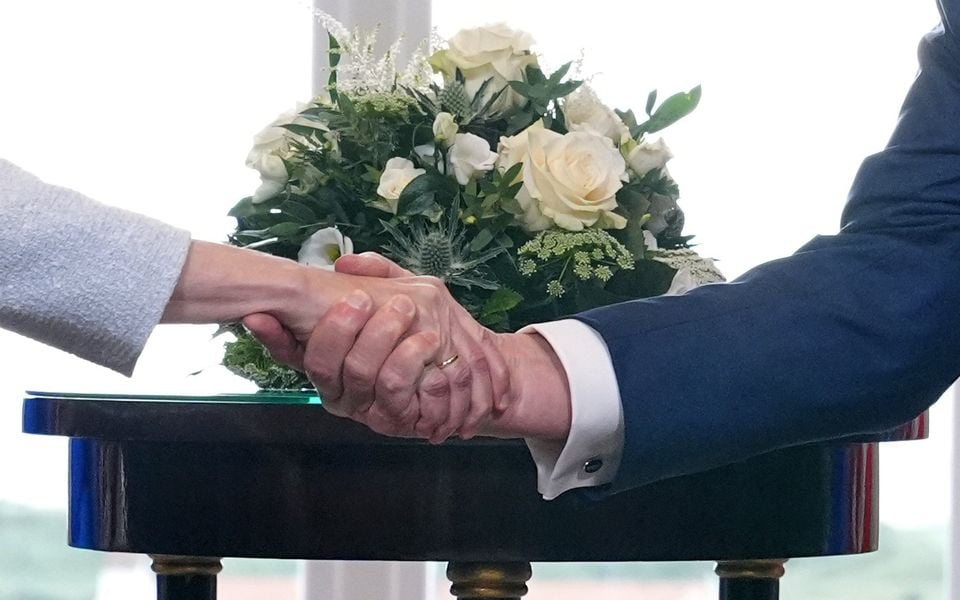
President Donald Trump and European Commission President Ursula von der Leyen shake hands after reaching a trade deal at the Trump Turnberry golf course in Turnberry, Scotland, Sunday, July 27, 2025. [AP]
Almost the only thing that can be said with any certainty about the EU-US trade deal that Ursula von der Leyen agreed with Donald Trump in Scotland last weekend is that it is a terrible outcome for Europe. True, it is not as bad as it could have been. The 15 percent baseline tariff on most EU exports to the US is half the 30 percent that the US president had threatened to impose on August 1. But it is still far above the 1.5 percent average tariff on European imports that the US was charging at the start of the year. Until a few weeks ago, Brussels had been holding out for a zero-for-zero tariff deal and threatening retaliation if Trump imposed any new tariffs at all. No wonder political and business leaders are angry.
Worse, the deal effectively turns back the clock on 80 years of transatlantic trade liberalization and deepening economic ties. It will raise the average effective tariff rate to around 16 percent, not far off the 19.8 percent peak in the 1930s when the introduction of the notorious Smoot-Hawley Act led to a devastating trade war that deepened the Great Depression and triggered political and economic turmoil in Europe. While many details remain vague, the only consolation for Europe is that while the hit to its economy will be bad, knocking an 0.5 percentage points off GDP by the end of 2026 according to Goldman Sachs estimates, the blow to the US economy is likely to be greater at an estimated 0.7 percentage points of GDP.
But does this deal provide European companies with much-needed stability, as European Commission President von der Leyen suggested? It is hard to be optimistic. At least this time, unlike in the 1930s, Europeans resisted the temptation to retaliate. That makes economic sense. Just because America has decided to heap costs on its citizens who want to buy cheaper European goods, that is no reason for Europeans to do the same. But Europe’s reluctance to retaliate has less to do with a commitment to free trade principles so much as divisions among member-states. They worried that, lacking powerful weapons such as China’s control of rare earths, they would struggle to win a trade war, while Trump might respond by withdrawing security guarantees or abandoning Ukraine.
Brussels hopes that it can chip away at high US tariffs, extending plans under the deal for zero-for-zero tariffs on aerospace and semiconductor equipment to other sectors. But history suggests that it is much easier to put tariffs up than bring them down. Trump is already boasting that tariff revenues rose fourfold in May, which suggests that higher taxes on imports could fill much of the $3.4 billion hole in the federal budget created by his “Big, Beautiful Bill.” Just as Joe Biden didn’t reverse Trump’s first-term tariffs on China, future presidents will find it hard to give up the extra revenue.
Europe’s reluctance to retaliate has less to do with a commitment to free trade principles so much as divisions among member-states
Nor can the EU be confident that the deal will draw a line under tensions with America. Brussels congratulated itself on Sunday that it had resisted Trump’s bullying demands to rewrite its regulatory rulebook for sectors such as digital services, agriculture and pharmaceuticals. But it would hardly be a surprise if Trump revived these demands at some point. After all, this is what US businesses wanted above all from a free trade deal. Instead they face the worst of both worlds: higher import taxes and no enhanced market access. What’s more, Trump has shown time and again that his word is not to be trusted.
The way forward for Europe is clear enough: It needs to take steps to strengthen its own economy and de-risk its relationship with America so that it cannot be so easily humiliated again. That means seeking new free trade deals with the rest of the world. It also means reducing barriers to trade in its own single market which the International Monetary Fund says are the equivalent of a 46 percent tariff on goods and a 110 percent tariff on services. The good news is that this is the approach that the Commission under von der Leyen is adopting.
But the danger is that the apparent failure of Brussels to defend Europe’s interests will embolden those opposed to deeper economic integration while fueling demands for protection at the EU and national level. Already the EU faces demands to raise tariffs on steel to protect the industry from cheap imports diverted from the US. Worse, the perception that the EU is a pushover could make it harder to strike deals. China’s reluctance to make concessions at last month’s EU-China summit is an ominous signal that, like Trump’s America, it thinks Europe lacks leverage.
Simon Nixon is an independent journalist and commentator on British, European and international political economy and geoeconomics.